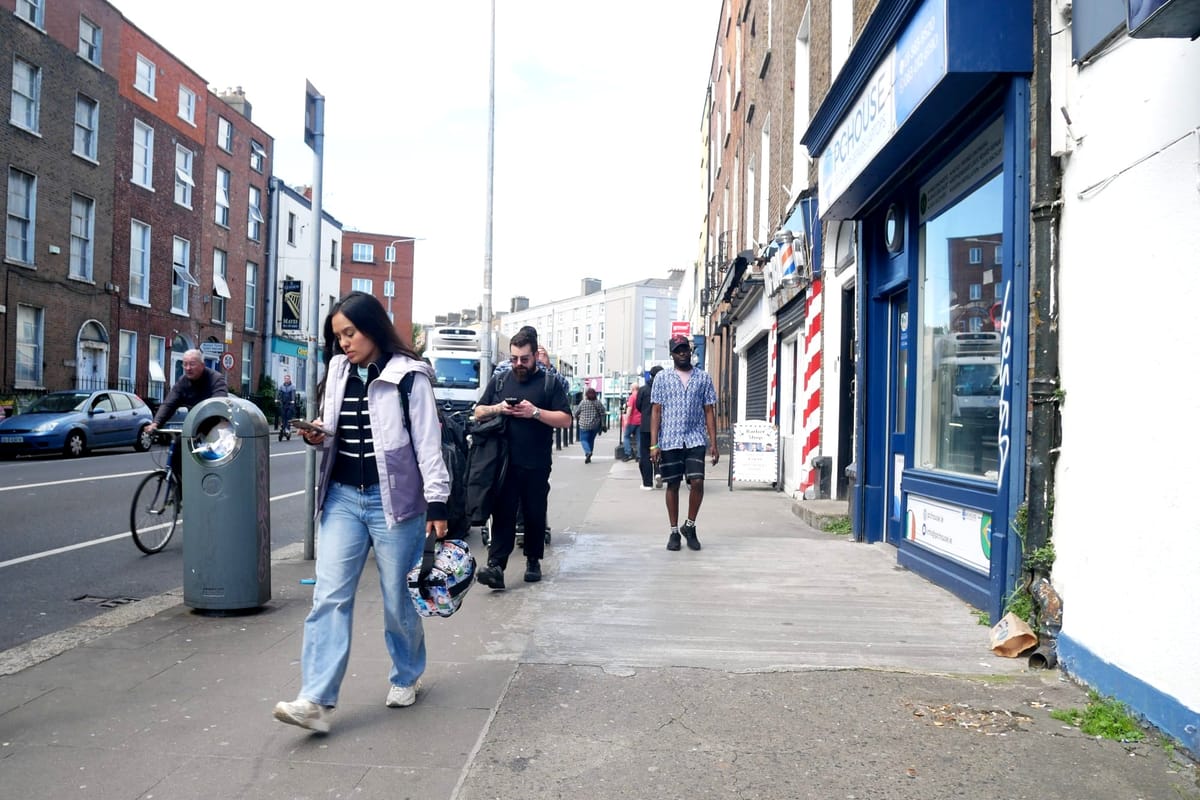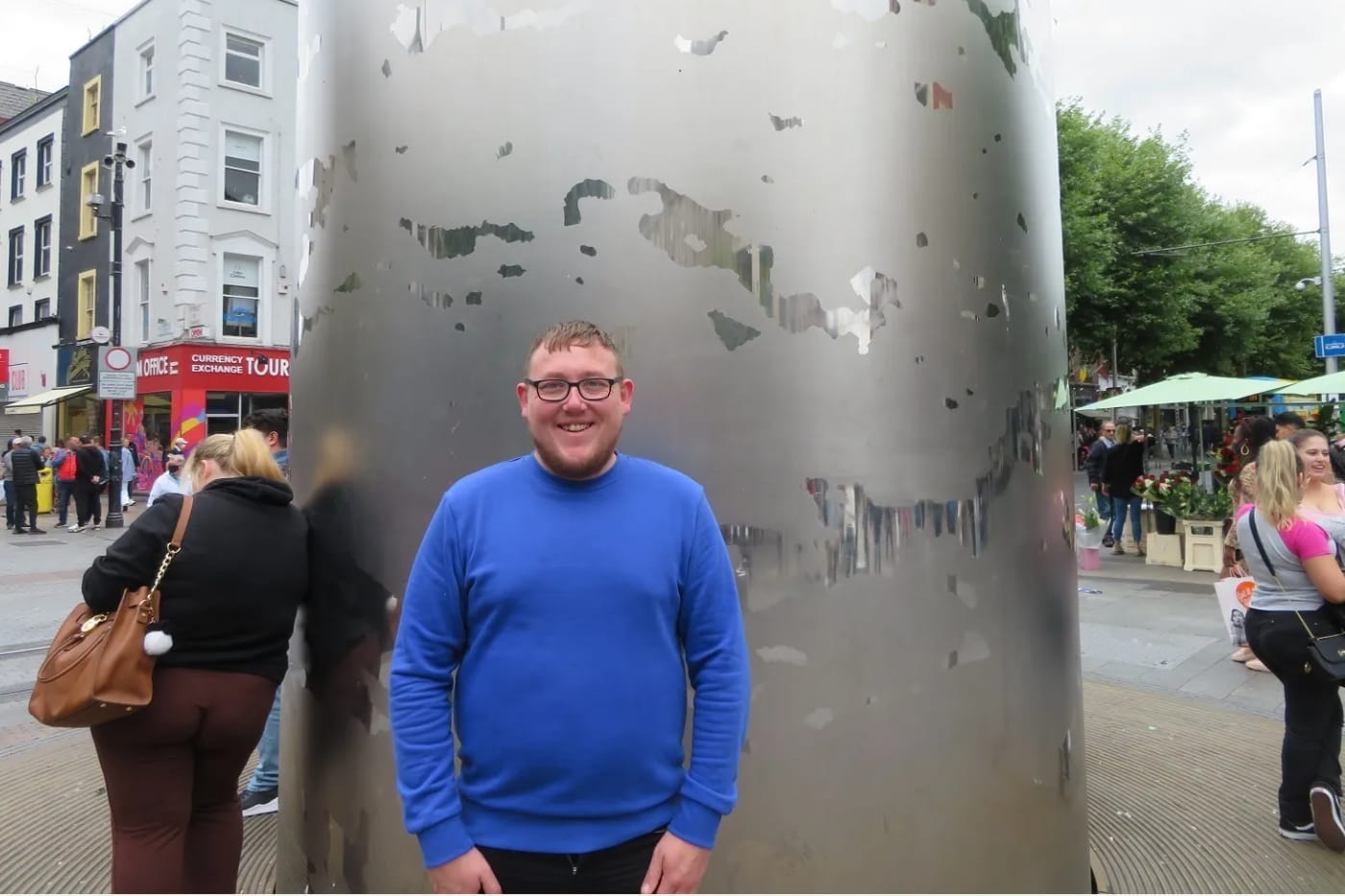Who will sit on the advisory board set to shape the future of Dublin city centre?
Seven areas of expertise should be represented, said a recent council report.
“Focus Ireland would prefer energies went into ending homelessness rather than moving around its victims,” says Mike Allen, director of advocacy.

Ciara Mahon is standing beside the River Liffey, across the road from the Merchant’s Quay day centre. She is wearing a blue hoodie, her red hair is pulled back in a bun.
She had been homeless for a few years, she says – until earlier this year.
And for a few months of that homelessness last year, she was staying in a hostel in Lucan, she says. “That was a logistical nightmare, so it was.”
She had never been to Lucan before. The bus from town took more than an hour.
Most days, she travelled back into the city centre to meet up with friends. Her partner at the time was in a hostel in the city centre, she says.
Mahon says that sometimes she didn’t have bus fare. Other times, she says, she missed the last bus home – and ended up sleeping on the streets.
It is easier for homeless people if hostels are in town, says Mahon. “Most people would prefer that you know. It's just simpler and more straightforward.”
Most, but not all, homeless services for the Dublin region, especially for single people, are located in Dublin’s city centre.
But last October, the Dublin City Taskforce recommended spreading hostels more around the region. The Programme for Government says it will consider the appropriate distribution of drugs and homeless services.
Social Democrats Councillor Lesley Byrne asked Dublin City Council officials on Monday, in a written question at the council’s monthly meeting, whether the Liberties area was to be included in any review of where services are.
The Department of the Taoiseach is currently engaging with government agencies to map all existing services “to inform next steps”, said the written response from council chief executive Richard Shakespeare.
Over the past week, homeless people expressed different views on the advantages and challenges of spreading services around.
Some, like Mahon, don’t favour the move, saying it will leave them isolated and further from the cluster of supports that they may need. Others said they want homeless services closer to where they come from.
Mike Allen, director of advocacy with Focus Ireland, says that whether spreading out homeless services is a good idea depends on how it is done – which depends on who it is being done for.
On and off for years, there have been flare-ups of complaints from community groups and businesses about the concentration of homeless services in areas of the city.
In 2016, residents in the Liberties went to court to challenge a community centre being converted to a homeless hostel, arguing that there were 12 homeless services in the area, reported The Journal at the time.
In 2020, Dublin City Council Chief Executive Owen Keegan told councillors that homeless services were most concentrated in the north-east inner-city, where there was one unit of emergency accommodation for every 57 residents, according to RTÉ.
In 2023, Eddie Mullins, the CEO of Merchants Quay day centre, said he thought there was an overconcentration of homeless and drug-treatment services in the inner-city.
“Don’t get me wrong we need more of them – but we are putting them all in the one area,” he said.
As homelessness has risen, so too has the number of hostels in the city centre. During the Covid-19 lockdowns, tourist hostels in the city centre were converted to homeless hostels to try to keep people safer from contagion.
In June this year, an interdepartmental group that was formed to work on the Dublin Taskforce recommendations set a goal to: “Manage overconcentration of vulnerable groups in small geographical areas, and relocate existing provision, where possible and appropriate.”

As Louisa Santoro, the CEO of the Mendicity Institution, sees it, the problem isn’t overconcentration of services, though – it’s poorly managed homeless services.
Well-run homeless services should work with neighbours to minimise disruption, through good-neighbour policies, Santoro says.
But some privately-run hostels don’t monitor what happens on the street outside, she says. There is no line for neighbours to contact management with complaints, she says.
“The more chaotic it is, the less structure that is applied and the worse it gets,” says Santoro. “It's not going to correct itself.”
A spokesperson for the Dublin Region Homeless Executive (DRHE) says that its role is to make sure there is enough accommodation for people experiencing homelessness.
“We have an open tender process whereby providers can submit suitable properties,” says the spokesperson.
“The concentration of suitable accommodation in the heart of the city, is as a result of the availability of suitable properties and proximity to support services,” she said.
There are advantages to the homeless accommodation being in the city centre, said Keith Maguire, who lives in a hostel in town.
“A lot of people would prefer it in town because they are so used to the city now,” Maguire said on Tuesday by phone.
“People more spread out would feel more isolated, especially being homeless; it can be tough on their mental health,” he said.

Everything is available in the city centre. Whether people need help or if they are looking for a job, it makes life that bit easier, he said.
Also, some people like the anonymity of using service in the city centre, said Mullins, the CEO of Merchants Quay day centre.
Then again, maybe it would be better to have services in the suburbs, said Aleksandrs Gutorovics on the phone on Tuesday. He is also staying in a homeless hostel in town at the moment.
“Spreading them would be nicer,” he says. It would prevent people from getting together in groups to drink in the city centre, he says.
For families with children, it can be really exhausting when their emergency accommodation is far from their kids’ schools.
In June 2022, Andrew Connors and his family of seven were living in a B&B on Gardiner Street in Dublin’s city centre, while the older children were in school in Tallaght.
His wife was under enormous strain, he said at the time. She would get up early to drive the children to school, head back through city-centre traffic to spend some time with the younger ones, and drive back to collect the older ones again.
“There is no break at all,” he said, at the time. “It’s a full-time job.”
With all the time on the road, they often missed meals in the hostels, he said.
Santoro, the CEO of the Mendicity Institution, says she thinks it would be challenging to redistribute homeless services.
“What does that look like for someone who needs services?” she says.
She isn’t sure if it would be possible to replicate the services that exist in the city centre throughout the suburbs.
At the moment, people who use her day service often also use other services.
In need of healthcare, they can drop in to Safetynet, a medical service for homeless people. They can access the Ana Liffey Drug Service too and Trinity Court, a methadone treatment service, and Merchants Quay, she says.
They can also get easily to the DRHE offices in Parkgate Street, she says.
If people are put in the suburbs, transport could be a major issue, says Santoro.
She would support opening homeless services in a suburb if local people there need them, she says. “The motive needs to be that there is a demand for it locally.”
Mike Allen, director of advocacy with Focus Ireland, also says that whether scattering homeless services around would work, depends on how it is done.
“If it is just based on ‘sharing the burden’, it will lead to resistance and place people in communities where they will be ostracised and unable to integrate,” he says.
If done with a client-centred approach, taking into account where social services are available to people, it could have some benefits, says Allen.
Ultimately, though, government should be putting its efforts elsewhere, he said.
“Overall, of course, Focus Ireland would prefer energies went into ending homelessness rather than moving around its victims,” he said.